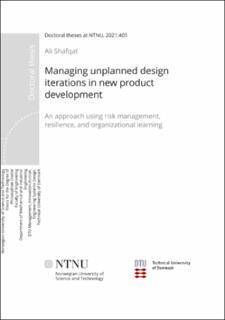| dc.contributor.advisor | Welo, Torgeir | |
| dc.contributor.advisor | Oehmen, Josef | |
| dc.contributor.author | Shafqat, Ali | |
| dc.date.accessioned | 2021-12-16T15:38:41Z | |
| dc.date.available | 2021-12-16T15:38:41Z | |
| dc.date.issued | 2021 | |
| dc.identifier.isbn | 978-82-326-5856-5 | |
| dc.identifier.issn | 2703-8084 | |
| dc.identifier.uri | https://hdl.handle.net/11250/2834779 | |
| dc.description.abstract | Most new-product development (NPD) engineering projects encounter uncertainties from rapidly shifting market demands and developing technologies resulting in requirements change and the organization's ability to implement state-of-the-art processes reliably. This complexity triggers unplanned design iterations in the engineering design phase of the NPD process. These unplanned design iterations can be assumed to be the occurrence of a specific class of NPD project risks. Unplanned design iterations ultimately cause failures in reaching cost, schedule, quality, and customer satisfaction targets.
Today's organizations utilize traditional risk management practices to mitigate risks in NPD projects. However, even with mitigation actions in place, projects still struggle to manage NPD project risks. Therefore, this PhD thesis explored the utilization of risk management, resilience, and organizational learning in managing unplanned design iterations risk in the design and development of new products. To achieve this aim, we used different research methods including literature review, case study, cross-sectional interviews and survey.
The empirical findings of this PhD thesis suggest that risk management processes must be tailored according to the contextual factors of the NPD projects to manage unplanned design iterations. The overlap of risk management-based and resilience-based approaches is required to treat known and unknown NPD project risks that may cause unplanned design iterations. The thesis's findings recommend developing a structured approach for selecting suitable learning methods for managing unplanned design iterations after their occurrence. Finally, the thesis's findings suggest establishing a systematic approach for capturing newly generated knowledge in the resolution of the unplanned design iterations employing organizational learning. | en_US |
| dc.language.iso | eng | en_US |
| dc.publisher | NTNU | en_US |
| dc.relation.ispartofseries | Doctoral theses at NTNU;2021:405 | |
| dc.relation.haspart | Paper A: Shafqat, Ali; Oehmen, Josef; Welo, Torgeir; Willumsen, Pelle. The cost of learning from failures and mistakes in product design: Reviewing the literature. Proceedings of the International Conference on Engineering Design 2019 ;Volum 1.(1) s. 1653-1662 https://doi.org/10.1017/dsi.2019.171 This is an Open Access article, distributed under the terms of the Creative Commons Attribution-NonCommercial-NoDerivatives licence (CC BY-NC-ND 4.0)
(http://creativecommons.org/licenses/by-nc-nd/4.0/), | en_US |
| dc.relation.haspart | Paper B: Shafqat, Ali; Welo, Torgeir; Oehmen, Josef; Willumsen, Pelle; Wied, Morten. Resilience in Product Design and Development Processes: A Risk Management Viewpoint. Procedia CIRP 2019 ;Volum 84. s. 412-418 https://doi.org/10.1016/j.procir.2019.04.248
This is an Open Access article distributed under the terms of the Creative Commons Attribution-NonCommercial-NoDerivatives License (CC BY-NC-ND 4.0) (http://creativecommons.org/licenses/by-nc-nd/4.0/), | en_US |
| dc.relation.haspart | Paper C: Shafqat, A.; Oehmen, Josef; Welo, Torgeir. Planning unplanned design iterations using risk management and learning strategies. Journal of engineering design 2021 https://doi.org/10.1080/09544828.2021.1994531
This is an Open Access article distributed under the terms of the Creative Commons Attribution-NonCommercial-NoDerivatives License (CC BY-NC-ND 4.0)(http://creativecommons.org/licenses/by-nc-nd/4.0/), | en_US |
| dc.relation.haspart | Paper D:
Shafqat, A.; Oehmen, Josef; Welo, Torgeir; RIngen, Geir.
Empirical Investigation on the Role of Risk Mitigation Actions in Engineering Projects | en_US |
| dc.title | Managing unplanned design iterations in new product development: An approach using risk management, resilience, and organizational learning | en_US |
| dc.type | Doctoral thesis | en_US |
| dc.subject.nsi | VDP::Technology: 500::Mechanical engineering: 570::Machine construction and engineering technology: 571 | en_US |

